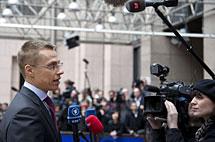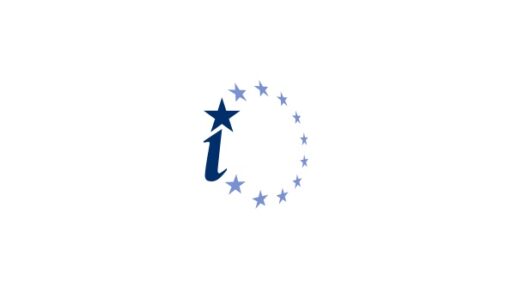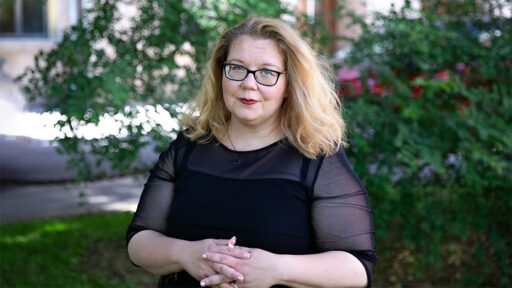Foreign Minister Stubb on Libya: EU recognises states only
 In the informal meeting of EU Foreign Ministers on Thursday, 10 March, the issue of recognising the opposition council of Libya became the centre of attention. According to Foreign Minister Alexander Stubb “Finland and the 25 other EU Member States were of the opinion that only states can be granted recognition”. The Foreign Ministers meeting was laying foundations for Friday’s extraordinary European Council Summit on Libya, where the heads of state aim to issue a strong declaration on the situation in Libya. According to Stubb, the message the EU as a whole wants to send now is that “Muammar Gaddafi must go, and he must go soon”.
In the informal meeting of EU Foreign Ministers on Thursday, 10 March, the issue of recognising the opposition council of Libya became the centre of attention. According to Foreign Minister Alexander Stubb “Finland and the 25 other EU Member States were of the opinion that only states can be granted recognition”. The Foreign Ministers meeting was laying foundations for Friday’s extraordinary European Council Summit on Libya, where the heads of state aim to issue a strong declaration on the situation in Libya. According to Stubb, the message the EU as a whole wants to send now is that “Muammar Gaddafi must go, and he must go soon”.
The question of recognising the opposition government of Libya came up mainly because France had announced that it considers the opposition government (National Transition Council, CNT) as the only legal government of Libya. However, Foreign Minister Stubb reminded that “we do not really know who these people are”. And, since the government also includes former ministers of the interior and justice who have acted in the administration of (the Libyan leader) Muammar Gaddafi for about twenty years, they have hardly been there to defend human rights.”
According to the Foreign Minister, there is no disagreement between French Minister of Foreign Affairs Alain Juppé and other EU Ministers on the fact that “we are discussing with all parties involved. However, we cannot grant any recognitions,” Foreign Minister Stubb pointed out in the press conference he held in Brussels.
Stubb estimated that, all in all, the EU has succeeded well in its Libya policy over the past two and a half weeks. “At first, we were able to issue a firm declaration. Then, at Finland’s initiative, we imposed sanctions at record speed. The humanitarian aid has been concentrated to the border of Libya and Tunisia, where the need for it is the most urgent. As far as potential military intervention, such as implementation of a no-fly zone, is concerned, the planning naturally falls under the auspices of NATO and implementation of such a decision would probably require a resolution by the UN Security Council.”
Foreign Minister Stubb also emphasised the crucial importance of the organisations of the countries in the region. “The EU cannot act alone or with the United States only, but it has to cooperate primarily with the Arab League, and also with the African Union and the Gulf Cooperation Council."
According to the Foreign Minister, planning of measures involving military resources is necessary. “If, for instance, mass killings such as those in Ruanda were to start in Libya, we should have ready-made plans. If, in such a case, the UN were to issue a resolution, we would already have the plans to implement." However, at the same time, the Foreign Minister strongly underlined that the no-fly zone often mentioned in international debates “is behind many locks, i.e. it requires support from the UN Security Council and the Arab League. It is a very difficult and massive military operation, requiring capacity to strike against missile defence, aircraft and so on.”
Plans for a declaration at the European Council Summit
With their informal meeting, the EU Foreign Ministers were laying foundations for a declaration the extraordinary European Council Summit, assembling on Friday, is supposed to decide on. According to Foreign Minister Stubb, the declaration could include the following elements: “It must condemn Gaddafi’s acts of war against his own people and express a wish that Gaddafi would exit voluntarily. It must be possible to discuss with all parties involved. In addition, it must take humanitarian assistance into account. The declaration should also state that if the situation gets out of hand, it must be possible to take action on the basis of UN Security Council resolution.”
According to Stubb, references to the European neighbourhood policy should also be made in the declaration. A mention of the International Criminal Court would also be important.
According to the Foreign Minister, floods of refugees from Libya are causing a lot of concern and uncertainty, since, according to unconfirmed information, there might, for example, still be about a million Egyptians in Libya. “That is why we have provided a substantial amount of humanitarian aid to the border of Libya and Tunisia. The big question mark is whether the Libyans themselves are forced to flee at some point due to hunger and violence, but this has not happened yet," Foreign Minister Stubb explained.
Additional information: Mikko Hautala, Diplomatic Adviser to the Minister for Foreign Affairs, tel. +358 40 834 6758, Jussi Seppälä, Press Counsellor, tel. +32 476 950 547


